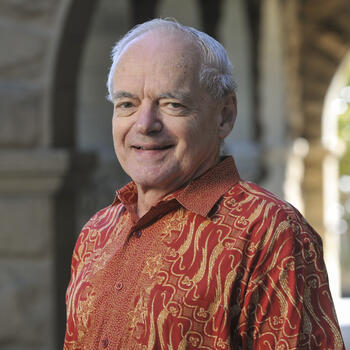Australian Ambassador to the United States Joe Hockey delivered remarks at the Shorenstein Asia-Pacific Research Center (APARC) on Monday. Addressing a Stanford audience, he said shared values define the Australia-United States relationship, and upon that foundation, the two countries work together to confront challenges facing the Asia-Pacific region.
The public seminar, Australia-United States Relationship in the 21st Century, co-sponsored by the Southeast Asia Program and U.S.-Asia Security Initiative, began with remarks from Hockey which were followed by a question and answer session moderated by Donald K. Emmerson, an emeritus senior fellow in the Freeman Spogli Institute for International Studies.
“America has somehow managed to build a global empire that the rest of the world wants to join,” said Hockey, who before becoming ambassador, served as treasurer of Australia and for 17 years as a parliamentarian.
“It’s the first empire in the history of humanity that hasn't had to invade a host of different nations in order to spread its values and increase its influence. The United States has managed to do it simply on the basis of values they believe in,” he added.
The United States, Hockey said, has underpinned its values through a sustained network of allies and strategic partners—Australia among them—that, similar to America, pledge to uphold human rights and freedoms.
Dissatisfaction, however, and voices demanding reform continue to spread inside and outside of the United States. Hockey said he sees a pattern in the populist movements happening around the world, each of them overlaid with an “anti-establishment mood.”
Two clear examples, Hockey cited, were Brexit and the election of Donald Trump to the U.S. presidency, and most recently, the resignation of Italian Prime Minister Matteo Renzi resulting from a referendum on laws concerning the composition of the country’s legislature.
Parallels can be seen between anti-establishment views in democratic and non-democratic societies, he said. For example, terrorist groups like the Islamic State attract sympathizers who feel they lack the ability to influence change within current structures.
Hockey said, “It's a failure of the institutions to respond in part to the needs of the people. That has been the ‘oxygen’ that’s fed resistance.
“The question is how we respond and how we include people along the way—which is what they are demanding. And to that, there is no easy answer.”
Describing the Trans-Pacific Partnership (TPP) as more than a trade deal, Hockey called it a “strategic partnership” and also an “immense disappointment” that President-elect Trump has said repeatedly that the United States will no longer be involved in it once the next administration takes office.
Bilateral trade agreements between the 11 other signatories could offer an alternative to the TPP, but domestic pressures in each country would slow the negotiation process and make it difficult to ratify anything. Those kinds of political realities would, however, encourage substitutes, he said.
“When one leader steps back, another steps in,” said Hockey, also a former chair of the G20 Finance Ministers and Central Bank Governors.
Hockey suggested that the Regional Comprehensive Economic Partnership (RCEP), a proposed trade agreement linking 16 Asian countries, would be sought as a substitute in the absence of the TPP. The United States is not a part of RCEP, which by design is a “by Asia for Asia” trade agreement.
Following the seminar, Hockey participated in roundtable discussions with Stanford faculty, researchers and students. He held meetings with Karl Eikenberry, the Oksenberg-Rohlen Fellow at Shorenstein APARC and former U.S. ambassador to Afghanistan, and George Shultz, the Thomas W. and Susan B. Ford Distinguished Fellow at the Hoover Institution and former U.S. secretary of state, among others.
Shorenstein APARC will host the Australian American Leadership Dialogue at Stanford this January. The Dialogue is a gathering of scholars and practitioners from Australia and the United States that aims to promote exchange of views on foreign policy, innovation and health, and to deepen the bilateral relationship.












